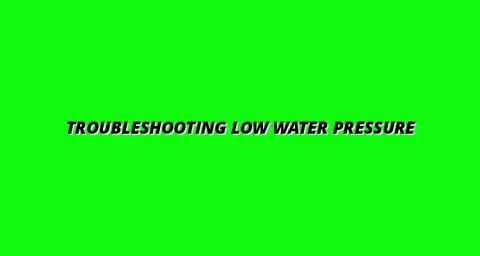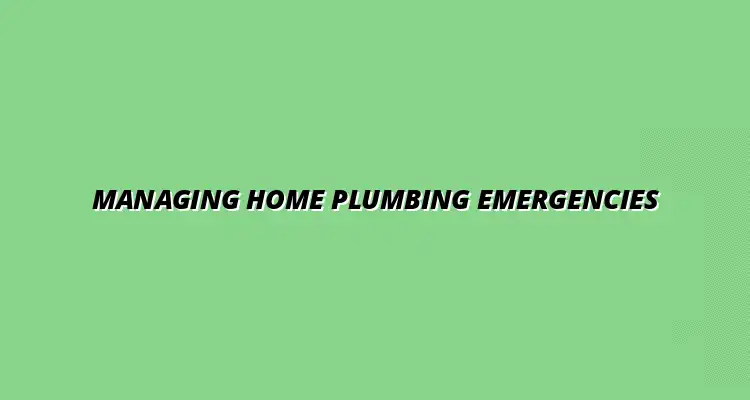
- Plumbing Basics
- Feb 26
2025-02-02
Plumbing emergencies can happen at any time, and knowing how to identify them is crucial for maintaining a healthy home. When faced with such issues, the faster you recognize the signs, the better you can handle the situation. In this section, we'll explore some of the most common plumbing emergencies and how to spot them.
By being aware of typical plumbing problems, you can act quickly and minimize potential damage to your home. Whether it's a minor issue like a leaky faucet or a serious situation like a burst pipe, understanding these emergencies is key to effective home management. Learning how to identify common plumbing problems is the first step in preventing bigger issues down the line.
Being vigilant about your plumbing can help you catch any potential emergencies before they escalate. Here are a few signs that indicate something may be wrong:
Leaky pipes can be a homeowner's worst nightmare! They often lead to significant damage if not addressed quickly. Not only can they create water damage, but they can also lead to mold growth and weaken your home's structure. Preventing leaks is key, and you can find helpful tips on winter pipe burst prevention.
To detect leaky pipes early, keep an eye on your water bill. If it suddenly spikes without explanation, it may indicate an undetected leak. Regularly check areas where pipes are exposed, like under sinks, for any signs of moisture.
Backed-up drains can create messy situations and unpleasant odors in your home. This issue often arises from a buildup of debris, grease, or tree roots invading sewer lines. When drains back up, water can overflow, causing damage to floors and walls.
Common signs of backed-up drains include slow drainage, gurgling noises, or foul smells. It's crucial to address these issues immediately to prevent them from becoming more severe! Regular plumbing system maintenance can significantly reduce the risk of backed-up drains.
Several plumbing emergencies can arise unexpectedly, so it's important to be prepared. Here are some common issues to keep an eye out for:
If you discover a sudden water leak, act quickly to avoid further damage! The first step is to locate the source and shut off the water supply to that area. This will help contain the situation while you assess the leak's severity.
Next, try to collect the leaking water using towels or buckets. If the leak is substantial, you may need to call in a professional to help resolve the issue safely. For serious issues, consider contacting a local plumber, such as a plumber in Birmingham.
Clogged toilets are a common household problem that can be quite frustrating. They often occur due to excessive toilet paper, foreign objects, or build-up of waste. Thankfully, there are some quick fixes you can try! A helpful guide on fixing a clogged toilet can help you resolve the issue.
Your water heater is essential for daily tasks like showering and washing dishes. If it starts to fail, you may notice signs like inconsistent water temperature, unusual noises, or leaks around the heater. It's essential to recognize these early warning signs! Regular maintenance, such as seasonal water heater care, is vital.
If you suspect your water heater is failing, check the thermostat settings and make sure the unit is receiving power. If problems continue, it might be time to consult a professional for repairs or replacement.
If you ever find yourself in the unfortunate situation of a burst pipe, it's crucial to act quickly! First, you should turn off the water supply to prevent further flooding. Next, it's helpful to assess the area for the extent of the damage and to see what you can do to minimize it.
Additionally, contacting a plumber should be one of your immediate actions. They can provide essential expertise and help you navigate through the repair process. Here are some resources to keep in mind:
In a burst pipe scenario, you can take several quick actions. First, make sure to:
These steps can significantly reduce damage while you wait for professionals to arrive.
Clogged drains can be a real hassle, but there are preventive measures you can take to avoid them! Regularly cleaning your drains and maintaining them helps keep everything flowing smoothly. Implementing preventative measures, such as those described in our guide on preventing plumbing emergencies with maintenance, is crucial.
By following these steps, you can greatly reduce the risk of experiencing a clogged drain in the future!
Cleaning your drains regularly is key to preventing clogs. Here are some strategies that can be useful:
Implementing a simple cleaning routine can help maintain a functional plumbing system!
Determining when to call a plumber can be tricky. It's always better to err on the side of caution, especially when it comes to your plumbing. Here are some signs that indicate it may be time to get professional assistance:
These indicators typically suggest that there’s a more serious problem that requires expert help.
Being aware of severe plumbing issues can save you time and money. If you experience:
These are clear signs that you shouldn’t ignore. A prompt call to a plumber can help prevent further complications!
Managing plumbing emergencies effectively starts with understanding the common issues. Always keep a list of emergency contacts handy and know the basics of how to shut off your water supply.
Here are some essential steps to remember:
Being prepared can make a big difference when plumbing troubles arise!
When a plumbing emergency strikes, it’s important to stay calm and act quickly. Having a plan in place is crucial, and remembering these steps can help:
Being proactive can save you from a lot of stress!
Proactive plumbing management is key to preventing emergencies. Homeowners should regularly inspect their plumbing and maintain good practices. This can save time, money, and hassle in the long run!
Establishing a routine for checks and repairs helps you stay ahead of potential issues. Remember:
Taking these simple steps can help you manage plumbing issues effectively and minimize emergencies!
Being prepared for plumbing issues can make all the difference! Understanding your plumbing system and having the right tools on hand helps you respond quickly. So, take the time to educate yourself and build a plan.
When you know what to do, you can handle plumbing emergencies with confidence, ensuring your home stays safe and functional!
